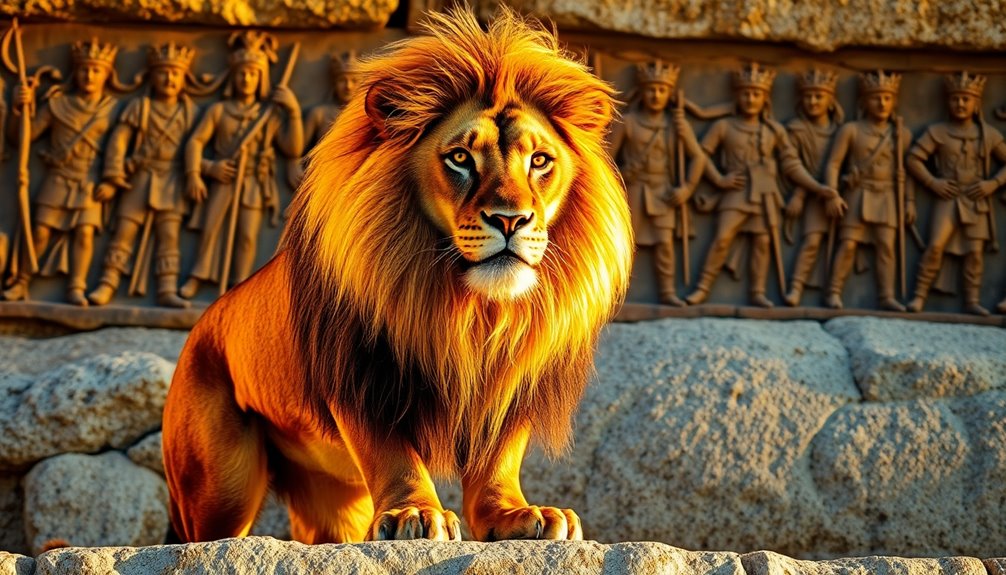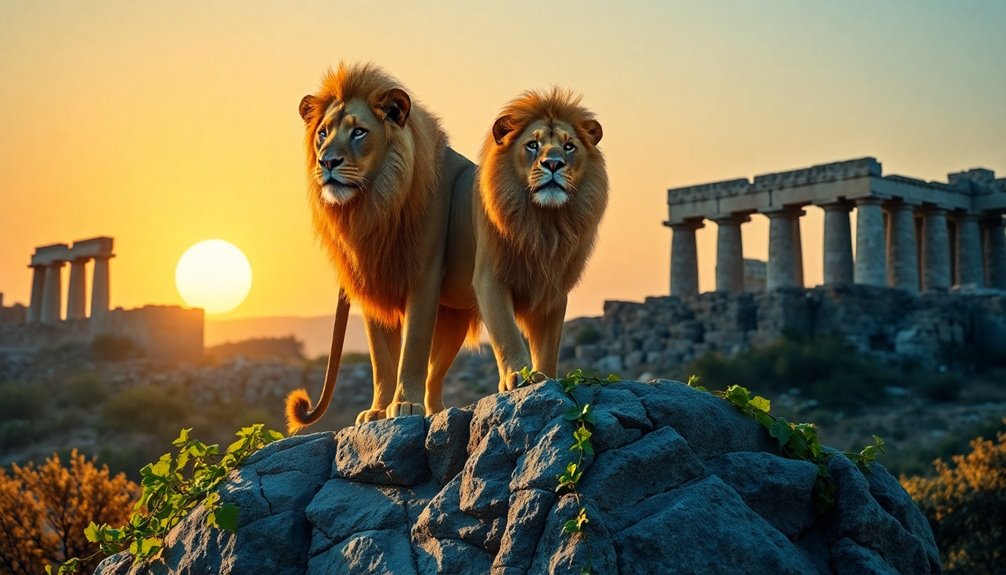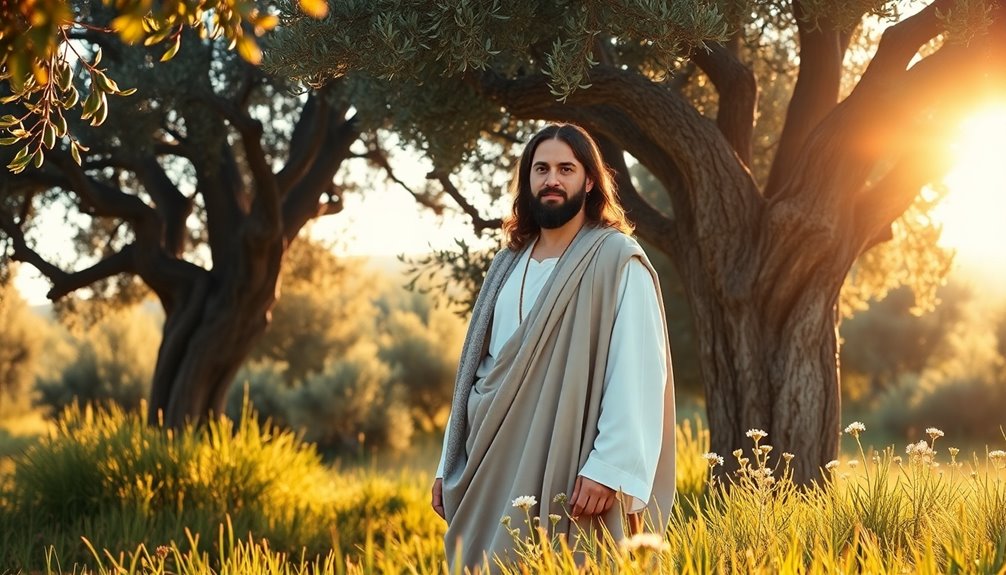The Lion of Judah is a profound symbol of strength, leadership, and divine authority, deeply rooted in biblical tradition. You'll find its origins in Jacob's blessing to Judah in Genesis 49:9, where it represents not just the Tribe of Judah but also signifies Jesus Christ's royal lineage. In Revelation 5:5, Jesus is described as the Lion, affirming His authority and redemptive role. This imagery also holds cultural significance within the Rastafari movement and Ethiopian heritage. If you're curious about its broader implications and history, there's much more to discover on this compelling topic.
Key Takeaways
- The Lion of Judah symbolizes strength, leadership, and divine protection, originating from Jacob's blessing in Genesis 49:9.
- It represents the Tribe of Judah, significant in the lineage of Jesus Christ, as mentioned in Matthew and Luke.
- Jesus is referred to as the Lion of Judah in Revelation 5:5, emphasizing His authority and redemptive role.
- The Lion of Judah serves as a national emblem in Ethiopia and symbolizes pride in the Rastafari movement.
- It reflects themes of moral responsibility, unity, and redemption within both personal faith and community worship.
Introduction

The Lion of Judah holds profound significance in both biblical texts and cultural symbolism. This powerful symbol originates from Jacob's blessing to his son Judah in Genesis 49:9, where it signifies strength and leadership. The lion represents the Tribe of Judah, which is essential in the lineage of Jesus Christ. In Revelation 5:5, Jesus is referred to as the Lion of Judah, emphasizing His authority and triumph as the promised King. This connection not only highlights His royal lineage back to King David but also fulfills Messianic prophecies that resonate deeply within Christianity.
As you explore this symbol, you'll find that the Lion of Judah embodies hope and divine protection in Christian theology. It illustrates Christ's dual nature as both a powerful ruler and a sacrificial savior.
Beyond biblical references, the Lion of Judah has been embraced in various cultural contexts, notably as a national emblem in Ethiopia. This broad adoption reflects its importance across Jewish and Christian heritage.
Understanding this symbol will deepen your appreciation for its rich history and the profound messages it conveys about strength, leadership, and divine promise.
Biblical Texts on Judah

When you explore the biblical texts on Judah, you'll find key references that highlight his significance in the Israelite narrative.
From Genesis 49, where Jacob likens Judah to a lion, to the powerful declaration in Revelation 5, these passages outline Judah's role in God's plan.
Understanding these scriptures will enrich your appreciation of Judah's legacy and the Lion of Judah's meaning.
Primary Bible References
Jacob's blessing in Genesis 49 provides a powerful foundation for understanding the significance of Judah in biblical texts. In this passage, Judah is described as a lion's cub, symbolizing strength and leadership among the tribes of Israel. Genesis 49:10 further emphasizes Judah's importance by prophesying that the scepter, representing kingship, won't depart from him. This establishes Judah as a critical player in the lineage of rulers.
The phrase "Lion of the Tribe of Judah" finds its ultimate fulfillment in Revelation 5:5, where Jesus Christ is identified as this lion, affirming His authority and role in messianic prophecy. Both Matthew and Luke trace Jesus' lineage back to Judah, linking Him to King David and underscoring the tribe's significance in the Messiah's heritage.
The imagery of the lion throughout biblical texts not only signifies power and majesty but also reflects God's protective nature. This dual symbolism enriches your understanding of Judah's role in God's plan, showcasing how this tribe is central to His promises and the unfolding narrative of salvation history. Additionally, the astrological traits associated with certain zodiac signs may also offer insights into leadership qualities reflected in biblical figures, further enhancing the understanding of Judah's significance.
Secondary Bible References
Biblical texts beyond Genesis also highlight the significance of Judah, reinforcing its central role in the narrative of salvation. In Genesis 49:9, Judah is described as a lion's cub, symbolizing strength and leadership. This imagery sets the stage for the promise given in Genesis 49:10, where it states that the scepter won't depart from Judah, indicating an enduring royal lineage. This lineage is critical as it leads to Jesus, the ultimate fulfillment of this promise.
Matthew 1:2-3 traces Jesus' genealogy back to Judah, underscoring His rightful claim as a descendant of Judah and David. Revelation 5:5 further identifies Jesus as the Lion of the tribe of Judah, emphasizing His authority to open the scroll and execute God's redemptive plan.
Hebrews 7:14 reinforces this by noting that Jesus sprang from the Tribe of Judah, highlighting the significance of His lineage in relation to His role as high priest and King of Kings. Ultimately, the texts paint a picture of Jesus as the Lion of Judah, ensuring ultimate victory and fulfillment in Jesus, confirming the profound implications of His heritage.
Judah's Role in Ancient Monarchy

The Tribe of Judah played a pivotal role in shaping the ancient monarchy of Israel, particularly through its lineage of powerful kings like David and Solomon. As the fourth son of Jacob, Judah received a significant blessing, highlighted in Genesis 49:10, which prophesies that the scepter won't depart from him. This established Judah's centrality in monarchy and leadership among the Israelite people.
After the united monarchy divided, the Kingdom of Judah emerged, primarily consisting of the Tribe of Judah and Benjamin, and continued to be ruled by Davidic descendants. However, this period was marked by political turmoil, as Judah faced conquest by Assyria and later fell to Babylon.
The destruction of Jerusalem and the First Temple in 586 B.C.E. signified a dark chapter in Judah's history.
Yet, the return from Babylonian exile in 539 B.C.E. allowed for the restoration of the Jewish community in Judah, reinforcing the importance of the Davidic line in governance.
Jerusalem, as the capital, remained a symbol of hope and unity for the people, highlighting Judah's enduring legacy in ancient Israel's monarchy.
Judah's Prophetic Significance Explained

Judah's prophetic significance unfolds in the rich symbolism found in Genesis 49:9, where he's described as a lion's cub, embodying strength and leadership among the tribes of Israel. Jacob's blessing in this passage emphasizes Judah's vital role in establishing a royal lineage that would ultimately culminate in Jesus Christ, the King and Messiah.
Genesis 49:10 further prophesies that the scepter will remain with Judah, highlighting the expectation of a future ruler.
As you explore Judah's narrative, you'll see themes of moral responsibility and redemption. His actions regarding Joseph and Tamar reveal his growth and leadership qualities, setting a precedent for the Tribe of Judah. This lineage includes significant figures like King David and Jesus, reinforcing the fulfillment of God's promises throughout biblical history.
The Lion of Judah imagery resonates powerfully, with Jesus identified as the "Lion of the Tribe of Judah" in Revelation 5:5. This title not only underscores Judah's prophetic significance but also reflects the enduring nature of leadership and authority that echoes through generations.
In understanding Judah, you grasp a crucial part of God's overarching plan for humanity.
Judah's Tribal Leadership Role

When you explore Judah's tribal leadership role, you'll find that many misconceptions cloud its true significance.
It's essential to clarify historical inaccuracies that often arise in discussions about Judah's influence and legacy.
Debunking Common Misconceptions
Many people hold misconceptions about the leadership role of the Tribe of Judah, often underestimating its significance in biblical history. You might think that Judah's influence is limited, but it's vital to recognize its foundational role. Jacob's blessing in Genesis 49:10 establishes that the scepter won't depart from Judah, indicating a lasting kingship that begins with King David and continues through King Solomon.
When the Kingdom of Judah emerged after the split from Israel, Judah became the dominant tribe, further cementing its leadership status. This legacy is crucial, especially when you consider that Jesus of Nazareth is identified as the Lion of the Tribe of Judah in the New Testament. This title not only fulfills messianic prophecies but also reinforces His authority as the Lion who conquered.
Moreover, historical records show that after the Babylonian exile, most returning exiles belonged to the tribes of Judah and Benjamin, further highlighting Judah's enduring leadership influence across generations.
Recognizing these facts helps clarify the Tribe of Judah's essential role in biblical history and its lasting impact on faith and leadership.
Historical Inaccuracies in Interpretations
Examining the historical interpretations of Judah's leadership role reveals a tapestry of complexities often overlooked. Many interpretations mistakenly portray Judah as an uncontested leader among the tribes of Israel, ignoring the shifting dynamics of tribal leadership throughout history. Judah's rise to prominence emerged from a complex family dynamic, particularly during the Joseph narrative, which highlighted moral growth rather than an inherent superiority.
You might also find that the common association of Judah's leadership with the kingship of David and Solomon simplifies the intricate leadership structures that existed in early Israelite society. The northern tribes wielded significant power and influence, especially before the monarchy divided. This indicates that Judah's leadership didn't uniformly translate into tribal dominance.
Moreover, misconceptions often overlook the theological implications tied to Judah's role. The narrative emphasizes God's sovereignty over human lineage and authority, reinforcing that leadership isn't merely about tribal merit but rather about fulfilling a divine promise.
Judah's Leadership in Worship

When you look at Judah's leadership in worship, you see powerful lessons for your personal faith and the importance of congregational unity.
The practices established by Judah, from sacrifices to communal festivals, can inspire how you connect with God and others in your faith community.
Exploring these elements can enrich your worship experience and strengthen your spiritual bonds.
Judah's Lessons for Personal Faith
Judah's journey serves as a powerful example of how personal faith can be strengthened through leadership in worship. His willingness to protect his family, as seen when he offered to take Benjamin's place as a slave, highlights the importance of responsibility and sacrifice in worship. This act reminds you that true faith often calls for selflessness and courage.
The story of Judah's moral growth, particularly his acknowledgment of wrongdoing with Tamar, teaches you about the value of repentance and redemption. Embracing these concepts can deepen your personal faith and foster a stronger relationship with God. As you reflect on Judah's narrative, consider how unity and reconciliation within your community of faith can enhance your worship experience.
Moreover, understanding that Jesus, as a descendant of Judah, ties worship to the historical and theological significance of God's promises and covenant is crucial. The Lion of Judah symbolizes strength and authority, encouraging you to approach God with reverence.
Congregational Unity Through Worship
Building on the foundation of personal faith established through Judah's example, congregational worship thrives on unity and shared purpose. The Lion of Judah symbolizes strength and authority, encouraging congregational unity as you engage in collective praise and reverence for God.
In the Temple of Jerusalem, where leaders like David and Solomon pioneered worship practices, communal worship became a vital expression of shared identity among the people.
Judah's lineage produced significant leaders who unified Israel under a common worship system, illustrating how effective leadership fosters congregational unity. His example of moral responsibility, particularly in the story of his intervention for Benjamin, reminds you of the values to embody in your worship practices. This moral grounding promotes mutual support and strengthens the bonds within your congregation.
As you embrace the imagery of the Lion of Judah in your worship contexts, you foster a sense of togetherness and shared purpose. Celebrating your collective identity in worship not only uplifts individual faith but also reinforces the communal commitment to glorifying God.
In doing so, you contribute to a vibrant and unified worship experience that resonates with the true spirit of Judah's legacy.
Judah's Enduring Legacy Today

Although the Tribe of Judah's historical significance is profound, its legacy continues to resonate in various aspects of modern culture and identity. The term "Jew" actually derives from Judah, meaning that most modern Jews are considered descendants of the Tribe of Judah or Benjamin, which highlights its lasting impact on Jewish identity.
The Lion of Judah symbolizes strength and leadership, playing a crucial role in various Christian organizations today. Historical figures like King David and King Solomon have left a remarkable imprint on Jewish tradition, reminding you of the tribe's rich heritage.
In Ethiopian culture, the Lion of Judah appears prominently on the imperial flag, signifying a connection to the Solomonic dynasty and its descent from the Tribe of Judah. Furthermore, the Lion of Judah serves as a powerful emblem within the Rastafari movement, where it represents African pride and sovereignty.
This ongoing influence extends the Tribe of Judah's legacy into contemporary cultural expressions, showcasing its importance across diverse communities. Whether in religious contexts or cultural symbols, the essence of Judah's strength and leadership remains vital in today's world.
Additional Resources

To dive deeper into the significance of the Lion of Judah, there are numerous resources available that explore its rich history and cultural implications.
You'll find that the Lion of Judah, originating from Jacob's blessing in Genesis 49:9-10, serves as a powerful symbol of strength and leadership. In Christian theology, Jesus is a descendant of Judah, highlighted in the Book of Revelation 5:5, where He's recognized for His supreme authority and triumph over sin and death.
Books and articles discussing Messianic prophecies also provide insight into how the Lion of Judah connects Jesus to King David and the promise of an eternal kingdom.
You'll discover how this imagery reflects Christ's dual nature, contrasting His power as the lion with His humility as the lamb.
Additionally, exploring resources related to Ethiopian heritage and the Rastafari movement can show how the Lion of Judah symbolizes pride and sovereignty beyond Christianity.
Engaging with these materials will deepen your understanding of the Lion of Judah's multifaceted significance and its ongoing relevance in various cultural contexts.
Frequently Asked Questions
What Does the Lion of Judah Symbolize?
The Lion of Judah symbolizes strength, bravery, and authority.
When you think of this powerful emblem, you're reminded of its connection to kingship and royal lineage. It reflects qualities like courage and protection, often representing divine power.
In various cultures, it also signifies sovereignty and leadership. As you explore its significance, you'll see how it captures both the might of a lion and the richness of historical and spiritual heritage.
What Does the Lion Symbolize in the Bible?
In the Bible, the lion symbolizes strength, courage, and authority. When you read about lions, you see them representing divine protection and kingship, especially within the Tribe of Judah.
They embody God's formidable nature against adversaries. This imagery also reflects leadership and royal lineage, as many great kings descended from Judah.
Ultimately, the lion serves as a powerful reminder of God's sovereignty and the strength that believers can draw from Him.
What Does the Roar of the Lion of Judah Mean?
When you consider the roar of the lion, it represents power and authority.
This roar isn't just a sound; it's a declaration of strength and a call to awaken spiritually. It reassures you of protection and victory, reminding you that there's divine presence ready to defend against adversities.
You're invited to embrace this symbolism, recognizing that the roar signifies both leadership and the promise of triumph in your spiritual journey.
What Does the Name Judah and the Lion Mean?
When you explore the name "Judah," you discover it means "praised" in Hebrew, reflecting a deep gratitude.
The lion symbolizes strength and courage, highlighting its royal authority.
Together, Judah and the lion represent not just a tribe but a lineage of leadership and resilience.
It's about celebrating heritage and recognizing the power that comes from this combination, inspiring you to embrace the qualities of strength and praise in your own life.










